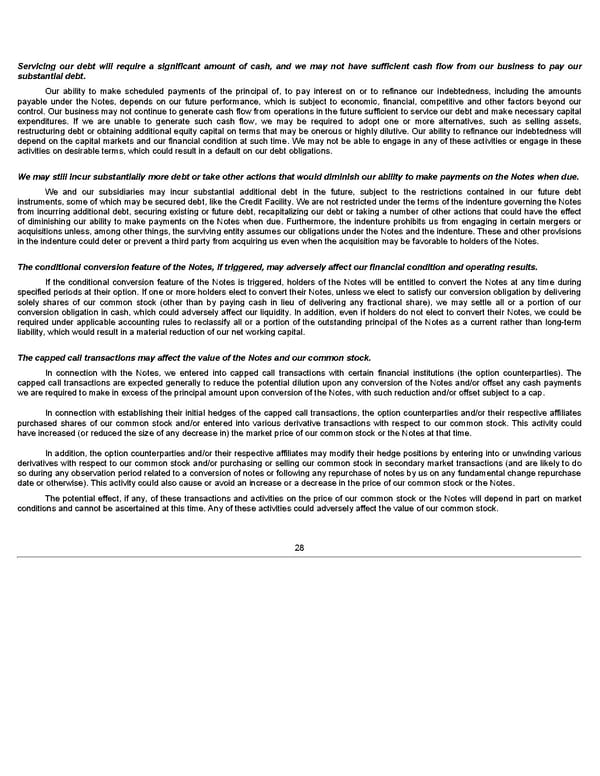Servicing our debt will require a significant amount of cash, and we may not have sufficient cash flow from our business to pay our substantial debt. Our ability to make scheduled payments of the principal of, to pay interest on or to refinance our indebtedness, including the amounts payable under the Notes, depends on our future performance, which is subject to economic, financial, competitive and other factors beyond our control. Our business may not continue to generate cash flow from operations in the future sufficient to service our debt and make necessary capital expenditures. If we are unable to generate such cash flow, we may be required to adopt one or more alternatives, such as selling assets, restructuring debt or obtaining additional equity capital on terms that may be onerous or highly dilutive. Our ability to refinance our indebtedness will depend on the capital markets and our financial condition at such time. We may not be able to engage in any of these activities or engage in these activities on desirable terms, which could result in a default on our debt obligations. We may still incur substantially more debt or take other actions that would diminish our ability to make payments on the Notes when due. We and our subsidiaries may incur substantial additional debt in the future, subject to the restrictions contained in our future debt instruments, some of which may be secured debt, like the Credit Facility. We are not restricted under the terms of the indenture governing the Notes from incurring additional debt, securing existing or future debt, recapitalizing our debt or taking a number of other actions that could have the effect of diminishing our ability to make payments on the Notes when due. Furthermore, the indenture prohibits us from engaging in certain mergers or acquisitions unless, among other things, the surviving entity assumes our obligations under the Notes and the indenture. These and other provisions in the indenture could deter or prevent a third party from acquiring us even when the acquisition may be favorable to holders of the Notes. The conditional conversion feature of the Notes, if triggered, may adversely affect our financial condition and operating results. If the conditional conversion feature of the Notes is triggered, holders of the Notes will be entitled to convert the Notes at any time during specified periods at their option. If one or more holders elect to convert their Notes, unless we elect to satisfy our conversion obligation by delivering solely shares of our common stock (other than by paying cash in lieu of delivering any fractional share), we may settle all or a portion of our conversion obligation in cash, which could adversely affect our liquidity. In addition, even if holders do not elect to convert their Notes, we could be required under applicable accounting rules to reclassify all or a portion of the outstanding principal of the Notes as a current rather than long-term liability, which would result in a material reduction of our net working capital. The capped call transactions may affect the value of the Notes and our common stock. In connection with the Notes, we entered into capped call transactions with certain financial institutions (the option counterparties). The capped call transactions are expected generally to reduce the potential dilution upon any conversion of the Notes and/or offset any cash payments we are required to make in excess of the principal amount upon conversion of the Notes, with such reduction and/or offset subject to a cap. In connection with establishing their initial hedges of the capped call transactions, the option counterparties and/or their respective affiliates purchased shares of our common stock and/or entered into various derivative transactions with respect to our common stock. This activity could have increased (or reduced the size of any decrease in) the market price of our common stock or the Notes at that time. In addition, the option counterparties and/or their respective affiliates may modify their hedge positions by entering into or unwinding various derivatives with respect to our common stock and/or purchasing or selling our common stock in secondary market transactions (and are likely to do so during any observation period related to a conversion of notes or following any repurchase of notes by us on any fundamental change repurchase date or otherwise). This activity could also cause or avoid an increase or a decrease in the price of our common stock or the Notes. The potential effect, if any, of these transactions and activities on the price of our common stock or the Notes will depend in part on market conditions and cannot be ascertained at this time. Any of these activities could adversely affect the value of our common stock. 28
 Annua lReport Page 27 Page 29
Annua lReport Page 27 Page 29